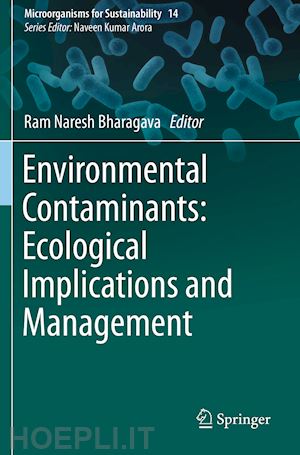
Questo prodotto usufruisce delle SPEDIZIONI GRATIS
selezionando l'opzione Corriere Veloce in fase di ordine.
Pagabile anche con Carta della cultura giovani e del merito, 18App Bonus Cultura e Carta del Docente
As we know, rapid industrialization is a serious concern in the context of a healthy environment. Various physico-chemical and biological approaches for the removal of toxic pollutants are available, but unfortunately these are not very effective. Biological approaches using microorganisms (bacterial/fungi/algae), green plants or their enzymes to degrade/detoxify environmental contaminants such as endocrine disrupting chemicals, toxic metals, pesticides, dyes, petroleum hydrocarbons and phenolic compounds are eco-friendly and low cost. This book provides a much-needed, comprehensive overview of the various types of contaminants, their toxicological effects on the environment, humans, animals and plants as well as various eco-friendly approaches for their management (degradation/detoxification). As such it is a valuable resource for a wide range of students, scientists and researchers in microbiology, biotechnology, environmental sciences.
Dr. Ram Naresh Bharagava was born in 1977. He received his B.Sc. degree (1998) in Zoology, Botany and Chemistry from the University of Lucknow, India, and M.Sc. degree (2004) in Molecular Biology and Biotechnology from Govind Ballabh Pant University of Agriculture & Technology (GBPUAT), India. He received his Ph.D. degree (2010) in the area of Microbiology jointly from Environmental Microbiology Division, Council of Scientific and Industrial Research (CSIR)-Indian Institute of Toxicology Research (IITR), Lucknow and Pt. Ravishankar Shukla University, Raipur, Chhattisgarh, India. He was a Junior Research Fellow (JRF) during his Ph.D., and passed the CSIR-National Eligibility Test (NET) twice and the Graduate Aptitude Test in Engineering (GATE) once. He has written one book entitled “Bacterial Metabolism of Melanoidins from distillery Effluent” and edited six books entitled “Bioremediation of Industrial Pollutants”, “Environmental Pollutants and their Bioremediation Approaches”, Ecofriendly and Emerging Approaches for Waste Minimization”, “Recent Trends in Environmental Management and Bioremediation of Industrial Waste for Environmental Safety: Industrial Waste and Its Management (Volume I & II). He has also authored and coauthored numerous research/review papers and two book reviews in respected national and international journals. He has also written several chapters for national and international edited books as well as a number of scientific articles, and has presented papers at national and international conferences. Further, he is a reviewer for various national and international journals. After a postdoctoral appointment at CSIR-IITR, Lucknow, he joined Babasaheb Bhimrao Ambedkar (Central) University, where he is currently an Assistant Professor of Microbiology and actively engaged in teaching at postgraduate and doctoral level as well as research on various Government of India (GOI) sponsored research projects in the field of Environmental Toxicology and Bioremediation. His major areas of research are the biodegradation and bioremediation of environmental pollutants in industrial wastewaters, metagenomics and wastewater microbiology. He is a member of the Academy of Environmental Biology (AEB), Association of Microbiologists of India (AMI), and Biotech Research Society (BRSI), Indian Science Congress Association (ISCA), India.











Il sito utilizza cookie ed altri strumenti di tracciamento che raccolgono informazioni dal dispositivo dell’utente. Oltre ai cookie tecnici ed analitici aggregati, strettamente necessari per il funzionamento di questo sito web, previo consenso dell’utente possono essere installati cookie di profilazione e marketing e cookie dei social media. Cliccando su “Accetto tutti i cookie” saranno attivate tutte le categorie di cookie. Per accettare solo deterninate categorie di cookie, cliccare invece su “Impostazioni cookie”. Chiudendo il banner o continuando a navigare saranno installati solo cookie tecnici. Per maggiori dettagli, consultare la Cookie Policy.